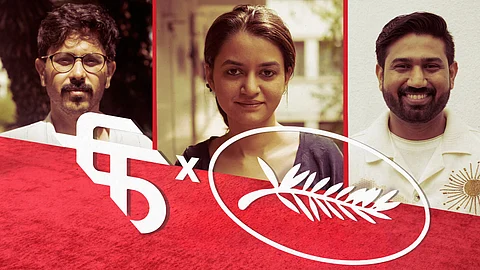
- Reviews
- Power List 2024
- Cannes 2024
- In-Depth Stories
- Web Stories
- News
- FC Lists
- Interviews
- Features
- FC SpecialsFC Specials

It’s a big year for Indian cinema at the Cannes Film Festival: From Payal Kapadia’s All We Imagine as Light being the first Indian film to compete at the festival in 30 years; to Maisam Ali’s In Retreat, which is the first Indian entry to Cannes’ ACID sidebar (Association for the Diffusion of Independent Cinema); to Chidananda S Naik’s student film Sunflowers Were the First Ones to Know, which was selected out of thousands of submissions from across the world to become the only Indian film in the La Cinef section of the festival this year. Additionally, Santosh Sivan became the first Asian to win the Pierre Angénieux tribute, which honours excellence in cinematography. The 1976 film Manthan, starring Naseeruddin Shah and restored by Shivendra Singh Dungarpur’s Film Heritage Foundation, was also screened as part of Cannes Classics. All the people mentioned above have one thing in common: They are proud alumni of the Film and Television Institute of India (FTII).
Established in 1960, FTII has been the nurturing ground for some of Indian cinema’s finest talents. Its notable alumni range from director Mani Kaul to Sanjay Leela Bhansali, and actors like Shabana Azmi, Rajkummar Rao, and Jaideep Ahlawat. The institute has seen occasional disruptions in recent years, most notably in 2015 when students protested the appointment of actor Gajendra Chauhan as chairman of FTII, questioning his credentials for the job since his only notable credit is acting in the television serial Mahabharat. Despite the persistent challenges faced by FTII in recent years, it has continued to produce some of Indian cinema’s most gifted practitioners and helped foster a community that has enabled filmmakers like Prateek Vats who directed Eeb Allay Ooo!, which was selected for the Berlinale and won the Filmfare Award for Critics’ Choice of Best Film (it is now available on Netflix).
In their interviews with Anupama Chopra, this year’s Indian filmmakers at Cannes credited FTII as being an integral source of inspiration and opportunity in their journey so far. According to Ranabir Das, cinematographer of All We Imagine as Light and Kapadia’s long-time collaborator, “This year is a testament to the space (FTII), and what has been happening there for many years now.” He described the institute as “a space that has given opportunities to a lot of us to grow and make films.” Speaking of Maisam Ali and her other Cannes-bound FTII colleagues this year, Kapadia said, “We grew up together in the time that we spent there. It was a space that changed us a lot in terms of how we think about the world and ourselves.” Filmmaking is a long process; it is important to find and work alongside like-minded people, and “FTII is a nice space to experiment and work things out, which also carries on later in life,” she added.
Besides providing training to its students, being a part of the FTII community may also have played a more practical part in these filmmakers’ Cannes journey. Naik made Sunflowers Were the First Ones to Know along with his classmates at the institute, including the director of photography Suraj Thaku, editor Manoj V and sound engineer Abhishek Kadam. In an interview with Film Companion, Naik joked about how production designer Pranav G Khot “missed his classes” to be a part of the film. Ladakhi filmmaker Maisam Ali expressed his gratitude for his crew who signed on to work on In Retreat for free, despite struggling to pay rent in Mumbai. “It’s very difficult if you’re not rich,” said Ali about the film’s financing challenges. “If I was not at FTII, I don’t think these many people would come together for a film. It’s because you have this support that you feel the courage to do it.”
Kapadia also emphasised how crucial it is for public-funded spaces like FTII to exist across the country, so that anyone can pursue a career in film. “At the end of the day, it’s really expensive to be a filmmaker,” she said. “It’s a little elitist to even think that you can do it, because it’s not easy. So if every state had a film school, I think it would be really nice for everybody to have the opportunity.”